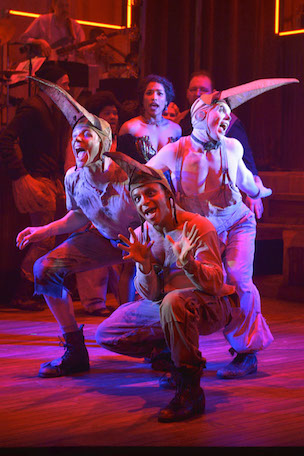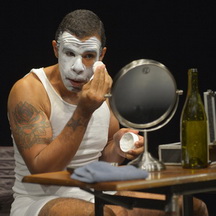
Our unfortunate collective violence
This past weekend ACT opened a new play at The Strand. Referred to in the program as a musical, The Unfortunates is set in wartime, and moves inexorably through the terrors of conflict, its emotions fueled by driving music and the bravura performances of its excellent multitalented cast.
The play first appeared at the Oregon Shakespeare Festival in 2013, as a part of that event’s Midnight Projects, and its popularity led ACT to work with the young creative team in developing the current production. Three of the five-man core of the creative team – Jon Beavers, Ian Merrigan and Ramiz Monsef – appear as the principal actors. Casey Hurt performs as the music director, pianist and guitarist. The fifth collaborator, Kristoffer Diaz, is described as “the gatherer of concepts”.
And concepts abound in The Unfortunates.
The play opens in a funky bar, where a scattering of guys hangs out to play piano and josh around. At the back of the stage two banners state, “The need for fighting men is urgent”. Uncle Sam’s “I Want You!” poster floats enormously over the stage. The guys’ low-key hanging out is interrupted by the entrance of General Goodtimes (Ramiz Monsef), commanding them to enlist. “The world’s gone mad,” he exhorts.
When asked what could be gained by enlisting, Goodtimes points stage left and The Victory Girls appear. Rae (Taylor Iman Jones), Roxy (Lauren Hart) and Madame (Danielle Herbert) in their gold lamé and military caps slither in to harmonize in their own seductive war song, vaguely reminiscent of USO Camp Shows. Inspired by the lovely Rae, the play’s hero, Big Joe (Ian Merrigan), signs up to become GI Joe.
At this point, it becomes clear that what we are watching is not historically based theater, but rather a kind of allegory. The walls of the pub fall away and the poster is ripped down to reveal the band on its own platform, lurking in the shadows of upstage. And what a band it is!
Composed of piano, bass and drums, with brass and woodwinds, the band supports the very strong singers that comprise the cast, and takes us through a bounty of American popular musical genres. The singers’ strongest suits are their gospel and blues, which give credence to the claim that the play took its original inspiration from the jazz/blues classic “St. James Infirmary”. The opening words “I went down” form the verbal ostinato of the play, realigning the words’ meaning from a description of moving from one place to another to that of being shot, killed or dying.
The music is more complex though, weaving in hip-hop, some serious syncopation and jazz rifts. It leads me to think of this work as an opera, rather than as a musical. In musicals, even given the revolution led by Sondheim, the play is the thing: the music is embellishment. In opera, the music is the thing: being the driving emotional force that provides the play’s action and cathartic release. And in The Unfortunates the music is the thing.
After Big Joe enlists, the next thing we see is Joe and his two buddies, CJ (Christopher Livingston) and Coughlin (John Beavers), imprisoned in a POW camp. The two buddies are shot by an ominous military keeper while Big Joe shivers in terror. The keeper, disgusted by Joe’s lack of manly bravery, pistol-whips him instead of killing him.
What follows is a long surreal dream of war and fear from the unconscious of the injured Joe.
All the characters are transformed into abstract and bizarre forms of their “real-life” selves. Rae becomes a wingless songbird. CJ and Coughlin, wearing the long-beaked masks of 17th-century plague doctors, become birds preying on the dying. Roxy floats by in a sheer pink baby doll outfit. The Preacher somehow loses his pants and is doomed to cavort about in boxers and garters. General Goodtimes becomes multiple evil characters, the Doctor and Stack, the personification of Fate.
The Unfortunates was a compelling musical journey. And like many of today’s entertainments it uses violence as both a means of commentary and a form of on-stage action. Violence, personal and collective, seems to be the primary means of expression and social commentary in our current warrior state. We need to examine that, just as we need to examine the mythologies we choose to embody. Perhaps that will lead us to create new mythologies and new modes of being.
– Jaime Robles
The Unfortunates continues at ACT’s Strand Theater through April 10. For tickets and information, visit act-sf.org.
Photo: (L to R) The Rooks (Jon Beavers, Christophe Livingston and Eddie Lopez) scavenge the killing fields in “The Unfortunates”, playing at ACT’s Strand. Photo by Kevin Berne.
